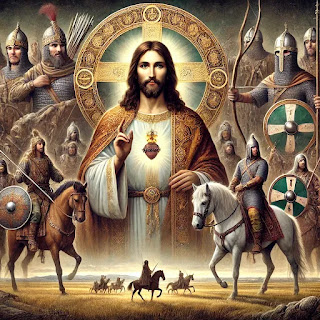By Bobby Darvish, Iranian-American Ex-Muslim, Former Vegan, Former Democrat, Former Socialist, Former CAIR-Columbus Executive Director, Former Muslim Forum of Utah President, Christian Conservative LDS Priest
As a former Muslim and someone who has deeply explored various religious and ideological systems, I have come to a profound understanding of Christianity's essence as a faith rooted in the teachings of Jesus Christ as found in the New Testament. Through my conversion and ongoing journey as a Christian Conservative Latter-day Saint (LDS) priest, I have gained clarity on the relationship between Christianity, the Old Testament, and the stark theological contrast Christianity holds with both Judaism and Islam.
The Old Testament, often referred to as the Jewish Torah, is not the doctrinal foundation of Christianity but rather a historical account of the Jewish people. While it contains moral teachings and prophecies that Christians believe point to Jesus Christ, its primary purpose was to serve as the covenant between God and the Israelites. The New Testament, on the other hand, marks the fulfillment of that covenant through Christ, offering a universal path to salvation, redemption, and divine grace.
This distinction is critical because it explains the apparent contradictions between the Old and New Testaments. The Old Testament emphasizes the Law, retribution, and strict adherence to rituals, while the New Testament centers on grace, forgiveness, and the transformative power of Christ’s atonement. Jesus explicitly sought to reform and fulfill the imperfections of Old Testament law. In Matthew 5:17, Jesus declares, “Do not think that I have come to abolish the Law or the Prophets; I have not come to abolish them but to fulfill them.” In doing so, He corrected what had gone astray in Jewish Pharisaic traditions, which were often rigid and legalistic.
Islam: Pharisaic Judaism 2.0
Islam, however, took its cue not from the transformative message of Christianity but from the rigid legalism of Pharisaic Judaism. Much of Islamic law mirrors the strictness of the Old Testament. Concepts such as dietary restrictions, ritual purity, and a punitive justice system find their echoes in Islamic Sharia. Mohammed crafted Islam as a continuation of what he believed was divine law, but his understanding was largely influenced by corrupted Judaic teachings prevalent in the Arabian Peninsula. The result was a religion that combined elements of Judaism’s Old Testament legalism with Arabian pagan practices, creating a rigid, controlling system.
As a former Muslim, I recognize how Islam diverged from the spiritual truths of Christianity. Its emphasis on law over grace, works over faith, and its authoritarian structure echo the very Pharisaic traditions Jesus came to reform. Islam’s inability to provide a personal relationship with God or to emphasize inner transformation has left billions trapped in fear and obligation rather than love and freedom.
Christianity’s Connection to Iranic and Germanic Paganism
One of the surprising revelations of my journey is how Christianity shares more in common with ancient Iranic and Germanic spiritual traditions than it does with either Judaism or Islam. The pre-Islamic Iranian religion of Zoroastrianism, for instance, emphasized duality—good versus evil—much like the Christian worldview. The worship of Ahura Mazda as the singular good deity resonates with the Christian God. Furthermore, Iranic pagan traditions often valued community, family, and moral integrity, elements that Christianity continues to champion.
Germanic paganism, too, has overlapping themes with Christianity, particularly in its concepts of heroism, sacrifice, and the eternal struggle against malevolent forces. The Norse idea of a hero’s ultimate sacrifice for the greater good echoes Christ’s atonement on the cross. This convergence suggests that Christianity is not a foreign imposition on the Indo-European soul but a fulfillment of its deepest spiritual yearnings.
By contrast, Judaism and Islam remain tied to Semitic legalism and exclusivism. Their focus is on tribal law and control rather than the universal love and redemption offered by Christ. The rituals, dietary laws, and societal rules of these faiths fail to resonate with the universal truths that Indo-European cultures instinctively cherish.
Conclusion
Christianity is not merely an extension of the Old Testament; it is a fulfillment and transformation of its principles through Jesus Christ. The contradictions between the Old and New Testaments are not flaws but evidence of Christ’s mission to correct and transcend the limitations of the Old Covenant. Islam, by mimicking the Pharisaic Judaism of the Old Testament, created a regressive and controlling system that stands in stark contrast to the liberating truth of the Gospel.
For those of us with Iranic and Germanic heritage, Christianity offers a spiritual home that aligns with our ancestors’ values of heroism, family, and moral order. It transcends the tribalism of Judaism and Islam and connects us to the universal, eternal truth of Christ.
As someone who has walked many paths—ex-Muslim, ex-vegan, ex-socialist—I have found in Christianity not only the truth but also the freedom that so many other systems lacked. In embracing the New Testament, I have embraced the ultimate fulfillment of both my ancestral heritage and my spiritual destiny.
Citations
- Holy Bible, Matthew 5:17
- Nasr, Seyyed Hossein, The Heart of Islam: Enduring Values for Humanity, HarperSanFrancisco, 2002.
- Nibley, Hugh, The World and the Prophets, Deseret Book, 1954.
- Boyce, Mary, Zoroastrians: Their Religious Beliefs and Practices, Routledge, 1979.
- Tacitus, Germania, Oxford University Press, 1999.


No comments:
Post a Comment